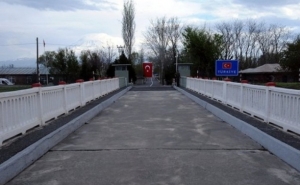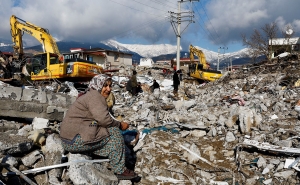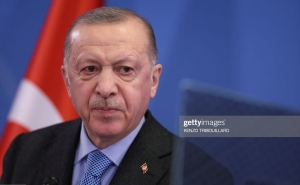Will Turkey Intervene to Syria?

Recently Turkish main opposition Republican People's Party (CHP) Secretary General Gürsel Tekin declared that Turkey had plans to launch a military operation in Syria. In response Turkish Prime Minister Ahmet Davutoglu labeled such kind of reports and the declaration of Turkish possible military intervention to Syria as "speculations without any basis." The new waive of discussions on the issue were further activated after Turkish Prime Minister Ahmet Davutoglu on May 10 passed Syrian border to visit the tomb of Suleyman Shah, grandfather of the founder of the Ottoman Empire, without prior notification to the Syrian government.
In order to make a sense how grounded these kinds of "speculations" on Turkish possible intervention to Syria are, one has to understand recent changes in the Middle East that somehow change the rules of the game among the countries in the region. The recent information disseminated in the media on possible secret plans between Turkey and Saudi Arabia to form a military alliance and to oust Syrian President Bashar al-Assad raises a logical question: what could make two nations with long history of rivalry to come to terms on Syria.
The main reasons for disagreement between Saudi Arabia and Turkey are connected with their different positions on the Muslim Brotherhood. After President Mohammed Morsi, a member of the Muslim Brotherhood, was ousted by the supporters of Egyptian Gen. Abdel Fattah el-Sisi, Saudi Arabia considered the move "as a crackdown on terrorism and promised to compensate Sisi for any military or economic aid withheld by the U.S. and the European Union in response to the coup," Huffington Post informs. On the other hand Turkey called the development in Egypt to be against democracy and welcomed exiled member of Muslim Brotherhood to Turkey.
The situation in the Middle East in general and in Saudi Arabia in particular has changed after January 2015, when King Abdullah of Saudi Arabia died and was succeeded by his brother Salman bin Abdul Aziz. Recent development in Yemen made the latter to slightly change Saudi’s long-held stance on Muslim Brotherhood. This change was conditioned by the fact that in Yemen the proponents of Muslim Brotherhood form as Sunni force that can fight against the Houthi rebels and thus directly or indirectly become Saudi ally.
Does this mean that possible joint-intervention from Turkey and Saudi Arabia to Syria is possible? To answer this question one also has to consider the other side of the coin and to see what the possible obstacles are. First, Turkey is a NATO member, while Saudi Arabia is a US ally in the region, thus no matter how much they oppose Iran’s possible nuclear deal and Iran’s subsequent increased role in the region they are unlikely to take action in Syria without prior consultation with US. Obama, on the other hand, will unlikely initiate new actions agonist Iran’s alley - President of Syria Bashar al-Assad thus risking positive outcome of negotiations with Iran. Second for joint cooperation in Syria Saudi Arabia and Turkey still have to develop sufficient level of mutual trust and overcome number of problems like, for example, opposite radical views on Israeli-Palestinian conflict. Finally one has to consider June 7 upcoming elections in Turkey. On the eve of elections Erdogan is unlikely to be engage in the Middle East chaos hence risking public support in Turkey and risking new uprising in Turkey.
Thus, if we measure pros and cons of Turkey’s possible intervention to Syria we come to a conclusion that in spite of the strong desire of the Turkish authorities to undertake it in the short-term perspective Turkey is unlikely to do that, as the price Turkey will have to pay can be too high.
Other materials on this subject
- Turkey Is Ready For a New Military Operation in Northern Syria Kalyn said. He also added that in the event of a threat, ''an assessment will be made and everything necessary will be done.''
- Russia, Iran and Turkey Discussed the Turkish Operation in Syria Russian side tried to convince Ankara to solve the problem by peaceful means, without resorting to violence.
- US Forces in Syria Attacked after Air rRids on Armed Groups Iran-backed armed groups had earlier promised to retaliate after the US launched several air raids on the groups in Iraq and Syria on Sunday.
- Syria: Assad's Baath Party Wins Majority in Parliamentary Polls More than 7,000 polling stations were set up across government-controlled parts of the country. Voting also took place in former opposition-held areas for the time since government forces retook much of...
- Russia, China Veto U.N. Approval of Aid Deliveries to Syria from Turkey The Security Council will now vote on a rival Russian text that would only approve one Turkish crossing for aid access for six months. During the coronavirus pandemic the council has been operating virtually,...
Other materials on this subject
- 2 dead, 2 injured after fire at lodging section of Armenian Catholic Church in Istanbul He said the firefighter-rescue team arrived immediately. Armenian Catholic Archeparch of Istanbul Archbishop Lévon Zékiyan was also on the scene.
- Turkey is sending Cold War-era cluster bombs to Ukraine – FP The weapons are designed to destroy tanks by bursting into smaller submunitions, which can linger on the battlefield for years if they do not immediately explode. Each round scatters about 88 bomblets.
- Fire erupts in Turkey’s Black Sea port of Samsun following explosion The causes for the explosion that led to a fire are currently being analyzed.
- EU Urges Turkey to Stop Offering Russia Solutions to Circumvent Sanctions Speaking about the EU's engagement with Turkey, an important neighbor, EU partner and candidate country for EU membership, we stress the importance of ensuring that Turkey's foreign policy is aligned with...
- Any Change of Internationally Recognized Borders in Region is Unacceptable – Iranian President to Erdogan "The basis of our policy in the region is that the fates of the countries must be determined by themselves and that their national sovereignty and territorial integrity must be respected" Raisi told Erdogan...
Other materials on this subject
- Yemen's Houthis Say Launch Drone Attack at Saudi Border Airport The attack was in response to "the continued escalation by the forces of aggression and their siege of the great Yemeni people," Yahya Saree, a military spokesman for Yemen's Houthi militia said in a tweet.
- Saudi-Led Coalition Declares 2-Week Coronavirus Ceasefire in Yemen: Al-Jazeera There was no immediate comment by the Houthis.
- Arab Coalition Launches Military Operation North of Hodeidah in Yemen Colonel Turki al-Maliki, spokesman for the Arab coalition, said the coalition forces foiled “an imminent terrorist act by the Houthi militia south of the Red Sea.”
- Yemen Govt Accuses UAE of Launching Air Strikes against Troops The deputy foreign minister did not say when the alleged air strikes took place.
- Yemen: Dozens Killed in Houthi Attack on Aden Military Parade The Houthis' official al-Masirah TV said the group launched a medium-range ballistic missile and armed drone at the parade, which it described as being staged in preparation for a military move against...
-
 17:08
17:08The regular session of the Anti-corruption Policy Council takes place in Jermuk
-
 15:05
15:05The Prime Minister sends congratulatory messages to the supreme leader of Iran and the President of Iran
-
 11:11
11:11Armenia sends earthquake aid to Turkey
-
 10:43
10:43Commemoration of the Pontiff St. Sahak Partev
-
 09:16
09:16Some roads are closed and difficult to pass in Armenia
-
 19:55
19:55Phone conversation of the Foreign Minister of Armenia with the U.S. Assistant Secretary of State for European and Eurasian Affairs
-
 18:30
18:30Prime Minister Pashinyan and President Khachaturyan meet
-
 18:20
18:20Ararat Mirzoyan with Co-Chairman of the OSCE Minsk Group of France Brice Roquefeuil
-
 17:01
17:01Humans could land on Mars within 10 years, Musk predicts
-
 16:45
16:45France, US urge 'immediate' end to Nagorno Karabakh blockade
-
 16:01
16:01Blockaded Nagorno Karabakh launches fundraiser to support quake-hit Syria
-
 15:59
15:59Earthquake death toll in Turkey rises to 18,342
-
 15:43
15:43Ararat Mirzoyan Held a Telephone Conversation with Sergey Lavrov
-
 15:06
15:06French president rules out fighter jet supplies to Ukraine in near future
-
 14:47
14:475 Day Weather Forecast in Armenia
-
 14:44
14:44President Vahagn Khachaturyan wrote a note in the book of condolences opened in the Embassy of Syria in Armenia
-
 14:20
14:20Azerbaijan’s provocations impede establishment of peace and stability – Armenian FM tells Russian Co-Chair of OSCE MG
-
 12:57
12:57France representation to OSCE: Paris calls on Azerbaijan to restore freedom of movement through Lachin corridor
-
 11:40
11:40Command of Kosovo forces highly appreciated preparation of Armenian peacekeepers
-
 10:16
10:16The United States withdrew from sanctions against Syria for six months the provision of assistance after the earthquake
day
week
month
Humidity: %
Wind: km/h









